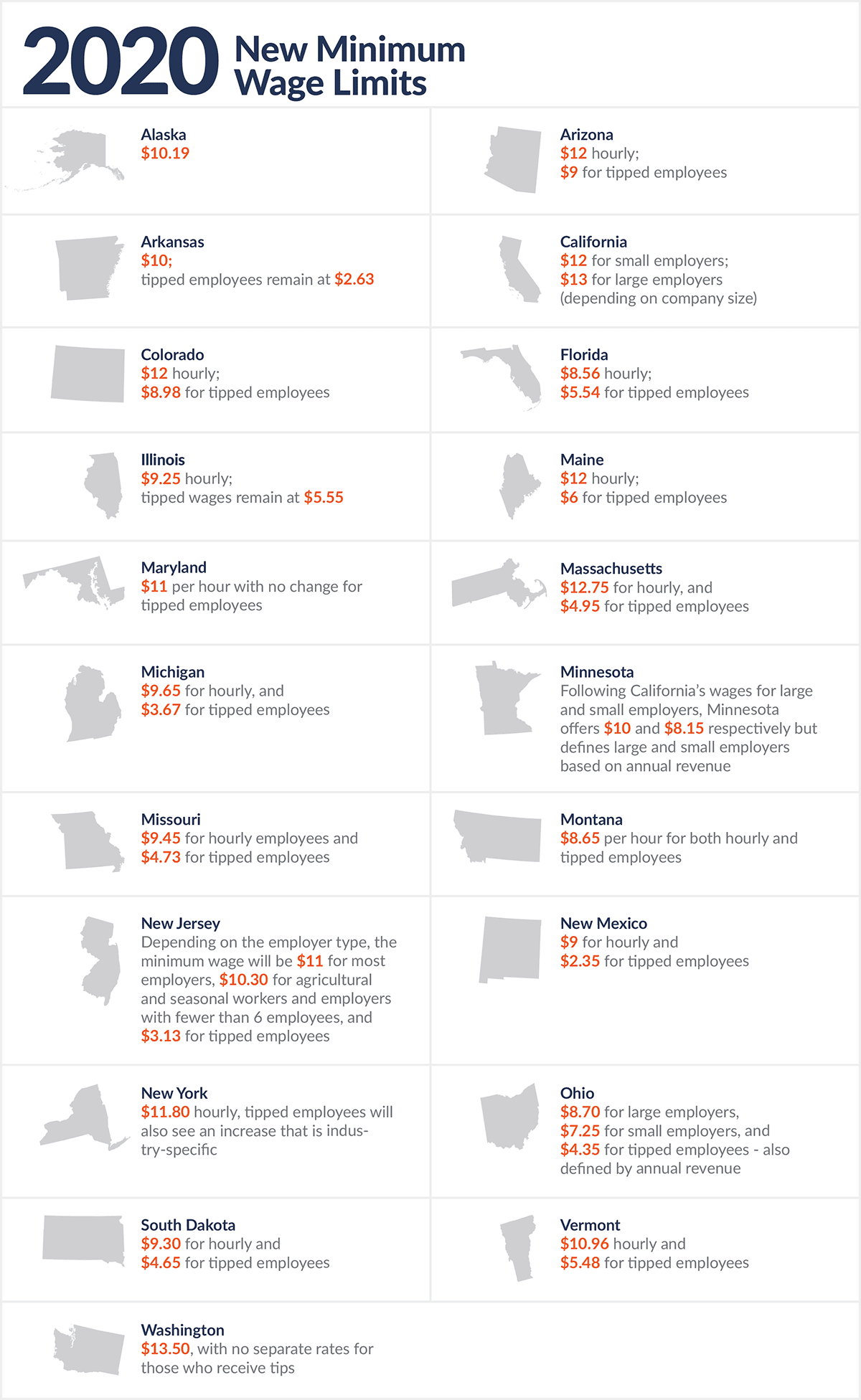2020 Vision: Labor Laws to Watch in the Year Ahead

They say, “Hindsight is 20-20,” but being well-versed on the new labor and employment laws in your state is critical to manage the future of your company. From minimum wage increases to mandatory paid sick leave, here are a few things you need to watch for in the coming year.
Minimum Wage Increases Across the Nation
From New York to L.A., more than 20 states will see an increase in minimum wage beginning January 1. On a federal level, the minimum wage remains constant at $7.25 — a number unchanged since 2009. As the cost of living rises, more states are opting to increase their wages to remain competitive in the face of a tight labor market. See the chart at the bottom of this article for a list of states with minimum wage increases in 2020.
For a full list of current minimum wages, by state, visit the Economic Policy Institute.
Employment Laws to Watch in 2020
Throughout the year, employers face frequent employment law challenges as new rules are enacted, legislations are passed, and companies scramble to remain compliant.
Here are a few new pieces of legislation to keep your eye on in the coming year:
Cities Setting Their Minimum Wage: Colorado recently repealed a ban that prevented cities from setting a minimum wage for their jurisdiction, as many of the cities have a varied cost of living, and this gives them the flexibility they need to address the employment needs of their residents. It is suspected that as more cities in Colorado begin to adjust their wages in correlation with the cost of living, that more states across the country will follow suit.
Paid Leave: Paid leave laws come in many forms and are complicated to understand. For example, 10 states, the District of Columbia and 22 other jurisdictions have or will soon have paid sick days laws in effect. Texas doesn’t currently require private employers to offer paid sick leave to any employees. However, San Antonio, Dallas, and Austin have tried to pass ordinances requiring them to do so. Dallas and San Antonio are in the process of enacting their laws, while the fate of the Austin laws remains to be seen.
Marijuana: As more laws are passed regarding the legality of marijuana for medicinal use, the impacts on employers also begin to rise. Beginning January 1, 2020, it will be legal in Illinois for adults to carry small amounts of cannabis, and employers will not be able to discriminate based on use. However, there is also a bit of a gray area in the Illinois law that has a provision about “impairment” in the workplace. It is expected the courts will eventually need to provide clarification.
Wage Theft: A new criminal provision of Minnesota law prohibits employers from intentionally committing wage theft. It is a felony if the amount is more than $1,000. If the wage theft amount exceeds $35,000, the fine goes up to $100,000 and could include a sentence of up to 20 years in prison.
Predictive Scheduling: Generally, predictive scheduling laws require employers to post work schedules between 7 to 14 days in advance of the first scheduled shift. Rules may also require adequate rest periods between shifts. Employers are expected to keep detailed records of all scheduling-related activities in case of audit. Chicago was the newest city to require predictive scheduling. The Chicago Fair Workweek Ordinance goes into effect July 1, 2020 and includes building services, healthcare providers, hotels and manufacturers, as well as the standard retail and food service occupations.
Other Resources to Stay Current on Employment Law
Want to stay current on employment laws affecting scheduling? Here’s a list of useful links to bookmark for reference throughout 2020:
Workforce Scheduling Technology is Key to Maintaining Compliance
In a world where change is the only thing that remains constant, employers must not avoid investing in strategies to stay up-to-date with the employment laws in their state, county, and/or city. There are severe legal risks and penalties for non-compliance. Additionally, non-compliance impacts employee satisfaction and retention, and can also damage your brand reputation. Workforce scheduling technology helps protect your organization from violation by automatically enforcing rules during shift assignment. Managers also gain visibility into non-compliance issues before they occur, so they can feel confident last-minute changes won’t push them into a vulnerable position.
Thankfully, powerful technologies have emerged to help business leaders effectively address multiple workforce challenges within their organization. The key is to invest in solutions that can configure to their unique workforce dynamics and also scale as business requirements change.

Labor Laws 2019Labor Laws 2021
Recommended Additional Resources
Subscribe to our blog.
Get the latest employee scheduling insights delivered straight to your inbox.

